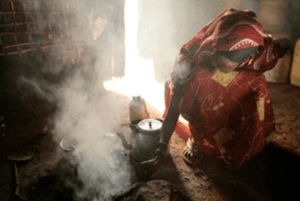600,000 Africans die every year from household air pollution

At the ongoing Annual Meetings of the African Development Bank (AfDB) in Lusaka, Zambia, which is discussing climate change and energy in Africa, the shocking information about the number of Africans dying every year from household cooking fuels has been repeated. And many who are hearing it for the first time can’t believe it, but it’s true.
An estimated 600,000 Africans – half of them children die every year from household cooking fuels air pollution.
While the information isn’t new, not many Africans are aware of the figures, as demands for source of the information on Twitter showed Wednesday May 25, 2016.
About 600,000 Africans die every year from household energy related pollution, half of them are children. #AfDBAM2016 #energy @AfDB_Group
— Emmanuel K. Dogbevi (@EmmanuelDogbevi) May 25, 2016
According to Africa Progress, an institution headed by former UN Secretary General, Kofi Annan, modern energy also means clean cooking facilities that do not pollute household air.
“An estimated 600,000 Africans die each year as a result of household air pollution, half of them children under the age of five. On current trends, universal access to non-polluting cooking will not happen until the middle of the 22nd century,” Africa Progress said in 2015.
The lack of energy is a global reality affecting so many people. About 1.1 billion people worldwide, which is roughly the population of India, is still living without access to electricity, with most of them concentrated in Africa and Asia, according to the World Bank Group.
Over 600 million of these people live in Africa. Another 2.9 billion rely on wood or other biomass for cooking and heating, resulting in indoor and outdoor air pollution attributable for 4.3 million deaths each year.
And the President of the AfDB, Dr. Akinwumi Adesina aptly captured the frustrations of the several hundred million Africans who are without electricity and clean energy, as he laid out the AfDB’s strategy to address Africa’s energy deficit.
“Africa is simply tired of being in the dark. Our goal is clear: universal access to energy for Africa within ten years. Expand grid power by 160 Gigawatts. Connect 130 million persons to grid power. Connect 75 million persons to off grid systems. And provide access to 150 million households to clean cooking energy,” he said.
During a roundtable discussion on the topic Africa’s Energy: What’s the New Deal? Former Nigerian President Olusegun Obasanjo, repeated the dire situation of Africans dying from household fuel fumes, and suggested that Africa should use whatever it has to generate electricity for its people.
Kofi Annan told the meeting that it is unacceptable that over 600 million Africans do not have modern electricity, adding “approximately 600,000 Africans die from pollution from household fire, half of them children.”
He indicates that the lack of modern energy in Africa is constantly undermining job creation among others.
Calling on African leaders, he asked them to create the right environments and policies for investments in energy, adding that decisive actions by African leaders are needed to reform utility services.
Mr Annan pointed out that Africa needs energy to create jobs and accelerated development to reach universal access to energy.
“This is essential and must be taken serious,” he said.
He called on the financial sector to be ambitious and cease the opportunity in the energy sector, noting that “long term national interests must override short term, political, corrupt and individual interests, so that the visions of lighting up Africa can be turned into tangible realities.
Dr. Adesina further called on Africa to unlock its energy potential because “Africa has no business being in darkness.”
Dr. Carlos Lopes, UN Under-Secretary and Executive Secretary of the Economic Commission for Africa wondered why there are 23 energy initiatives in Africa and every new one is seeking to leverage on the financing available to the existing ones.
He therefore called on African countries to look to domestic revenue mobilization to fund energy on the continent.
The situation would persist until 2030, unless something urgent is done to address it.
By Emmanuel K Dogbevi, in Lusaka, Zambia
Copyright © 2016 by Creative Imaginations Publicity
All rights reserved. This article or any portion thereof may not be reproduced or used in any manner whatsoever without the express written permission of the publisher except for the use of brief quotations in reviews.
